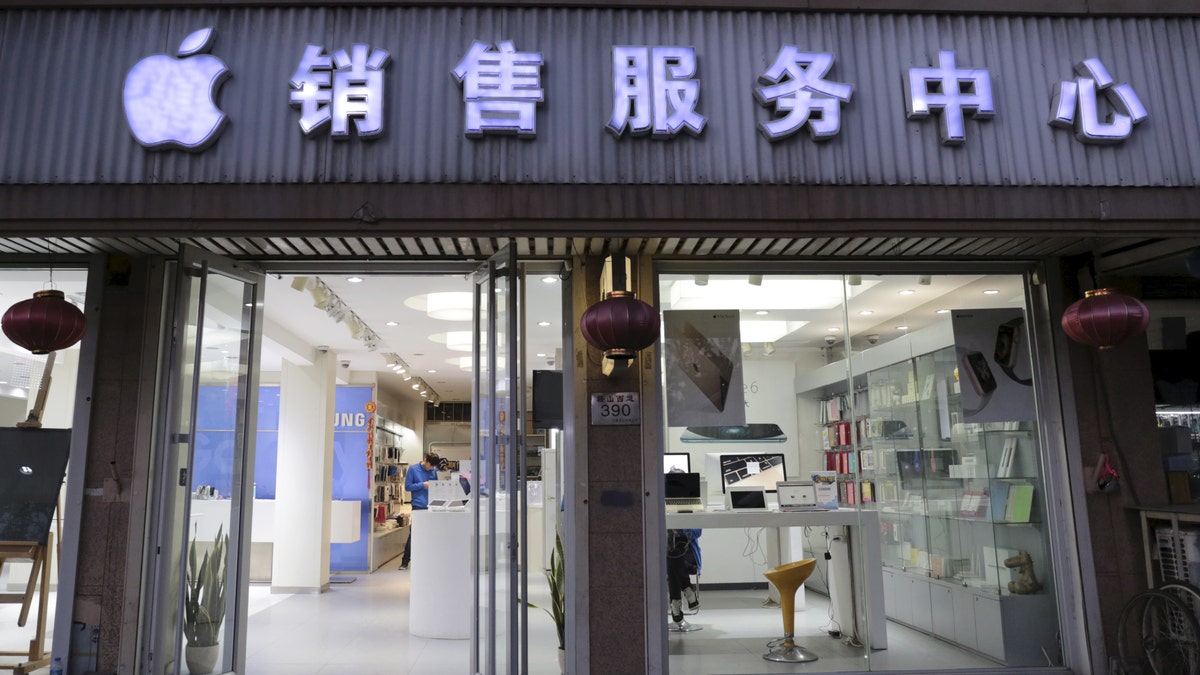
File photo - An employee is seen inside a shop selling Apple products in Tianjin, China, Oct. 29, 2015. (REUTERS/Paul Carsten)
Apple’s iPhone technology, which is at the center of a high-profile encryption row with the FBI, is also a raging success in China. So, how much of that involves ceding to demands of the Chinese government?
Apple’s iPhone sales in China were up 18 percent in the fourth quarter of 2015, according to a report from market researcher IDC. “Continued demand for Apple's iPhone 6S and 6S Plus, particularly in China and the U.S., elevated Apple in 2015 to 231.5 million units shipped in the year,” IDC said.
And Apple's overall business in greater China reportedly jumped to $59 billion in its last fiscal year.
Related: US cannot make Apple provide iPhone data in drug case, NY judge says
On the back of this success, a Feb. 26 report in the Los Angeles Times asserts that Apple’s approach to the Chinese market “has been far more accommodating” when compared to the defiance Apple has shown to an FBI request to help hack into an iPhone that belonged Syed Rizwan Farook, the shooter in the deadly terror attack in San Bernardino, Calif, last December.
Past behavior
Past behavior by Apple in China does point to a more accommodating attitude. The tech giant, for example, has censored certain apps in China and moved data onto state-owned China Telecom servers.
In October 2015, Apple disabled its news app in China, the New York Times reported. The self-censorship by Apple is an example of appeasing the Chinese authorities, according to one entrepreneur who does business in China.
“As someone who has run a business in China for the better part of a decade, Apple’s increasing sales, marketshare and dependence on China for growth gives me mixed feelings. The larger Apple gets in China, the more power and leverage the Chinese government has over the company,” wrote Larry Salibra, founder and CEO of Pay4Bugs, a crowdsourced pay per bug software testing platform, in a blog post at the time.
Related: The best thing about Apple's new iPhone SE might not be the phone itself
The storage of data on state-owned servers in August of 2014 has also been brought up often as an example of Apple ceding to pressure from Chinese authorities.
According to Reuters, Apple said that it moved the data to China Telecom servers “to increase bandwidth and improve performance for our customers in mainland china. All data stored with our providers is encrypted. China Telecom does not have access to the content."
But one expert says moves like this could make Apple vulnerable. “Apple does store iCloud data on servers at China Telecom but they claim the decryption keys are stored outside of the country,” Jonathan Zdziarski, an expert in iPhone security, told Foxnews.com, via email. “[But] I can tell you that the US government considers China to be a threat to our infrastructure. China is notorious for hacking our government and private industry. If Apple has as healthy a business relationship with China, then I hope they're at least smart enough to keep them at arm’s length,” he said.
Related: Americans are siding with the FBI in iPhone battle with Apple, new poll says
And while no one knows what Apple or the Chinese authorities would do if the company was ordered to allow access to encrypted data, The South China Morning Post, which in recent years has been known to reflect the views of the Chinese government, chimed in on the FBI court order in a Sunday editorial.
“So long as investigators have a court warrant they should be allowed access to encrypted information on a particular device in the same way as if they have obtained a warrant to search a house for evidence of a crime,” the Post wrote.
Pay4Bugs CEO Salibra is worried about how far the Chinese government and Apple may go in the future.
Related: France wants to fine Apple 1 million euros each time it refuses to decrypt an iPhone
"What worries me, is that the mechanism Apple uses to disable the News app and Apple Maps uses the location of the user to change the behavior of their device without their permission, even if the location service is disabled in the privacy settings," he wrote in the blog post.
"This 'China Kill Switch' is currently limited to disabling the News App and Apple Maps, but it is easy to imagine a Chinese government official asking Apple to extend that ability to other Apps and services on our iPhones."
Apple has not yet responded to a request for comment on this story from FoxNews.com.
